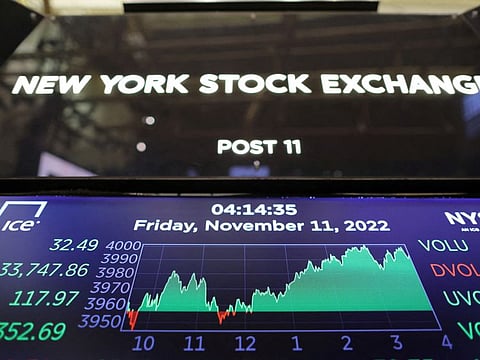Stock drop has VIX rising from pre-pandemic level
Wall Street’s so-called fear gauge - the VIX - climbed from the lowest since January 2020

New York: Stocks dropped, with Friday’s $4 trillion triple witching options event potentially amplifying volatility and traders weighing the impacts of a strike that hit Detroit automakers and sifting through a raft of economic data ahead of next week’s Federal Reserve decision.
The S&P 500 erased this week’s gain, while the Nasdaq 100 underperformed as giants like Amazon.com and Nvidia sold off. A gauge of chipmakers slid on a news report that Taiwan Semiconductor Manufacturing has asked major suppliers to delay shipment of high-end equipment. Ford Motor and General Motors whipsawed. Bond yields rose. The dollar wavered.
Wall Street’s so-called fear gauge - the VIX - climbed from the lowest since January 2020.
Piles of derivatives contracts tied to stocks, index options and futures are scheduled to mature Friday - compelling traders to roll over their existing positions or to start new ones.
“Options expiration forces people to adjust their positions, and this is an especially powerful expiration that can add fuel to market moves,” said Callie Cox at eToro. “This is especially prevalent in individual stocks, where trading in the shares and options can be thin. Brace for swings, but try not to tap out of this market until we see convincing evidence of a recession.”
From a fundamental standpoint, the challenges the labor market is facing with the United Auto Worker strike and looming government shutdown being the two biggest are concerning for markets,” according to Mark Hackett, chief of investment research at Nationwide.
“If the strike expands, investors can expect to see an impact on the broad economy and pressure on supply chains and corporate profit margins,” he notes.
US inflation expectations fell to the lowest in more than two years as consumers grew more optimistic about the economic outlook. Even so, sentiment fell to 67.7 - below the median estimate in a Bloomberg survey of economists. A measure of New York state factory activity unexpectedly expanded amid new orders. Production at factories barely rose in August, restrained by a drop in output of motor vehicles.
A resilient US economy will prompt the Fed to pencil in one more interest-rate hike this year and stay at the peak level next year for longer than previously expected, according to economists surveyed by Bloomberg News.
“In the near term, the economy’s resiliency has inspired a bit of optimism that perhaps the Fed can stick the landing this time after all,” said Jim Baird at Plante Moran Financial Advisors. “The collective consumer mood remains tentative not as negative as a year ago when recession fears were high, but still cognizant of the range of risks that continue to bubble.”
Equity funds saw the biggest weekly inflow in 18 months amid growing investor confidence the US economy is headed for a soft landing, according to Bank of America.
Global stocks attracted $25.3 billion in the week to September 13 - the most since March 2022 - according to EPFR Global data cited by BofA. But amid the renewed optimism on the US economy, strategist Michael Hartnett sees a bearish broader picture, with cash and Treasuries having attracted the bulk of inflows and both asset classes on track for a record year.







